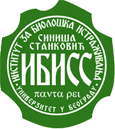Genetic transformations: Agrobacterium-mediated transformation are done with genes providing resistance to herbicide ammonium glufosinat (bar gene), tolerance to stress (NPK1 gene) and insect attacks (proteinase inhibitors), as well as genes involving in morphogenetic response (CKX- citokinin oxidase/dehydrogenase genes). Apart from optimization of methods and factors affecting plant transformation, the expression and inheritance of transgenes is followed by PCR, RT-PCR, qPCR and Southern blotting and regenerated transgenic plants are further tested for critical traits.
Secondary metabolite (SM) production: Secondary metabolite production is studied in relation to nutritive factors and conditions of in vitro culture with biotic and abiotic elicitors in medicinal and pharmacologicaly important species of Gentiana, Centaurium, Hypericum, Aesculus, Iris and Ocimum. Identification and characterization of SM is done with HPLC and other analytical methods. Continuous culture of A. rhizogenes transgene root cultures in biorectors is planed for Gentian species producing SM in their roots.
Heavy metal hyperaccumulation (HMH): The ability of Alyssum species to accumulate high levels of heavy metals, toxic to other plant species is investigated in obligatory HMH (A. markrafii), facultative HMH (A. murale) and endemorelict A. moelendorfianum from dolomite type soils. Heavy metal content in tissue is followed by ICP spectrometry and presence of different molecular forms of oxidative enzymes (Per, Cat, PO, SOD) by electrophoresis on PAA gels.
Plant responses to stress conditions: Increased stress tolerance induced by presence of the NPK1 gene is studied in potato, spinach and cabbage varieties. The activity of Per, Cat and SOD enzymes is studied in potato plantlets treated with salicylic acid during the high temperature and drought stress. Effects of both stress types are followed in dehydrins and heat shock proteins using functional essays, isoeletrofocusing, uni- and two-dimensional blotting.
Tropic movements: Ability of potato to perform phototropic and gravitropic movements is studied in in vitro grown plantlets in various light conditions. Investigations comprise analyses of light spectral composition, thresholds, reversibility, interactions and circadian regulation induced by shifts of periods of light and darkness.
Participating institutes:
- Institute for Biological Research "Siniša Stanković",
University of Belgrade - Faculty of Sciences and Mathematics, University of Niš
Project team:
Dr. Branka Vinterhalter, project leader
Dr. Dragan Vinterhalter
Dr. Snežana Budimir
Dr. Slavica Ninković
Dr. Nevena Banjac
Dr. Ivana Momčilović
Dr. Angelina Subotić
Dr. Snežana Zdravković-Korać
Dr. Dušica Ćalić
Dr. Slađana Jevremović
Dr. Dijana Krstić Milošević
Dr. Aleksandar Cingel
Dr. Milana Trifunović
Dr. Marija Marković
Dr. Jelena Savić
Dr. Branka Uzelac
Dr. Tatjana Ćosić
Dr. Jelena Milojević
Dr. Ljiljana Tubić
Dr. Martin Raspor
Dr. Nina Devrnja
Dr. Mariana Stanišić
Sofija Stupar
Maja Belić
Collaborators:
This email address is being protected from spambots. You need JavaScript enabled to view it.
This email address is being protected from spambots. You need JavaScript enabled to view it.
This email address is being protected from spambots. You need JavaScript enabled to view it.
This email address is being protected from spambots. You need JavaScript enabled to view it.
This email address is being protected from spambots. You need JavaScript enabled to view it.
This email address is being protected from spambots. You need JavaScript enabled to view it.
This email address is being protected from spambots. You need JavaScript enabled to view it.
This email address is being protected from spambots. You need JavaScript enabled to view it.




